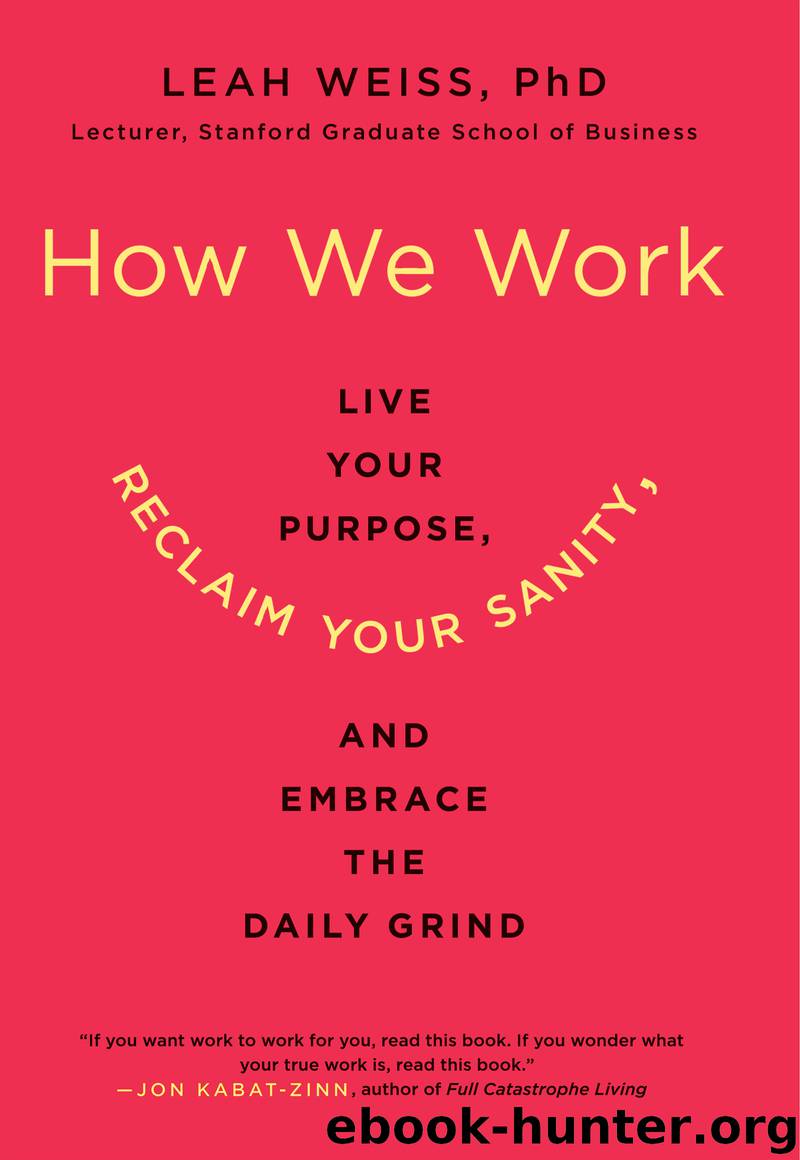How We Work by Leah Weiss PhD

Author:Leah Weiss, PhD
Language: eng
Format: epub
Publisher: HarperCollins
Published: 2018-02-20T05:00:00+00:00
THE FIRST ARROW: ENCOUNTERING SHAME
The workplace is a perfect storm of shame. Sometimes it happens because we messed up (as in objectively made a mistake or dropped the ball). Maybe I forgot that I was supposed to plan an event or create and send out the agenda for a meeting. Maybe I forgot to order an ingredient for the kitchen or supplies for the classroom, and everyone is showing up in five minutes and there’s no stuff. Maybe I forgot to show up for a guest lecture on self-compassion. There are multiple permutations of mortification.
Jeanne Tsai,5 a psychology professor at Stanford and director of the Culture and Emotion Lab, researches shame as an emotion pertinent to our identities and mental health. In her work, she has been particularly interested in how cultural influences make us feel ashamed. In her comparative research between Western and East Asian contexts, she has come to see that there are different versions of shame, specifically individual and collective. Shame is a problem in the West as well as the East, but predominantly for different reasons, which she attributes to differing cultural values. In the West, Tsai finds that we experience the greatest shame when we fall short as individuals. In East Asian contexts, shame is more readily evoked when one’s family or organization is let down.
While Tsai’s work offers fascinating insight into the different types of shame people experience within various cultural contexts, the most profound insight I take away from it is that there are multiple types of shame, and these different types of shame are evoked from different circumstances and different facets of ourselves. We feel deeply distraught when we let ourselves or others down. At the same time, living up to all the demands and expectations placed on us is an impossibility.
At work in particular, opportunities for both types of shame abound. After all, even in the most competitive, highly individualistic work environments, we can’t be 100 percent focused only on our own success. If we are getting paid for our work, by definition someone else must need it, must value it, and therefore their opinion of our work and of us matters. Work is fundamentally an exchange, and this makes it a social, interactive endeavor that includes the needs of ourselves and others. We have the reality of shared bottom lines, objective deliverables. We want to do well ourselves, so that we have opportunities to grow, to take on responsibility, and to earn more money, and we are ashamed when we fall short of these goals (or if others progress faster than we do).
If we work in an environment that is centered around individual rewards, such as bonuses and promotions, we’ll be incentivized to feel ashamed when we mess up as individuals. If we work in an environment that emphasizes collective success and incentivizes that the team rise or fall together, our attention will be directed to mistakes that impact the group’s success. In this environment, when we let the group down, we feel ashamed.
Download
This site does not store any files on its server. We only index and link to content provided by other sites. Please contact the content providers to delete copyright contents if any and email us, we'll remove relevant links or contents immediately.
Tools of Titans by Timothy Ferriss(8347)
Change Your Questions, Change Your Life by Marilee Adams(7718)
Deep Work by Cal Newport(7040)
Playing to Win_ How Strategy Really Works by A.G. Lafley & Roger L. Martin(6186)
Man-made Catastrophes and Risk Information Concealment by Dmitry Chernov & Didier Sornette(5981)
Digital Minimalism by Cal Newport;(5740)
Big Magic: Creative Living Beyond Fear by Elizabeth Gilbert(5726)
The Slight Edge by Jeff Olson(5398)
Ego Is the Enemy by Ryan Holiday(5392)
The Motivation Myth by Jeff Haden(5191)
The Laws of Human Nature by Robert Greene(5136)
Stone's Rules by Roger Stone(5065)
Tuesdays with Morrie by Mitch Albom(4753)
Eat That Frog! by Brian Tracy(4499)
Rising Strong by Brene Brown(4431)
Skin in the Game by Nassim Nicholas Taleb(4224)
The Money Culture by Michael Lewis(4174)
Bullshit Jobs by David Graeber(4161)
Skin in the Game: Hidden Asymmetries in Daily Life by Nassim Nicholas Taleb(3973)
